Will Covid restrictions be introduced in the UK after the new XBB variant?
>
After all Covid restrictions were finally dropped under Boris Johnson’s plan to live with the virus last year, many assumed Britain had seen the back of pandemic-era curbs.
But with the NHS battling its worst-ever crisis, the threat of some restrictions being brought back has reared its head again.
The virus’ resurgence is one of several factors piling pressure on the crippled health service. Experts have warned the new XBB.1.5 variant, nicknamed ‘the Kraken’, may exacerbate the current dire situation.
Here, MailOnline breaks down everything you need to know about the current virus situation…

Office for National Statistics (ONS) figures show 1.2million had the virus on any given day in the week up to December 9 in England


Latest Covid daily admission data shows nearly 1,300 people infected with the virus were hospitalised on December 19. The figure is up by a third week-on-week


The number of people infected with Covid taking up beds in wards across England soared above 8,600 on December 21, the latest data available shows. The figure has jumped 29 per cent in a week
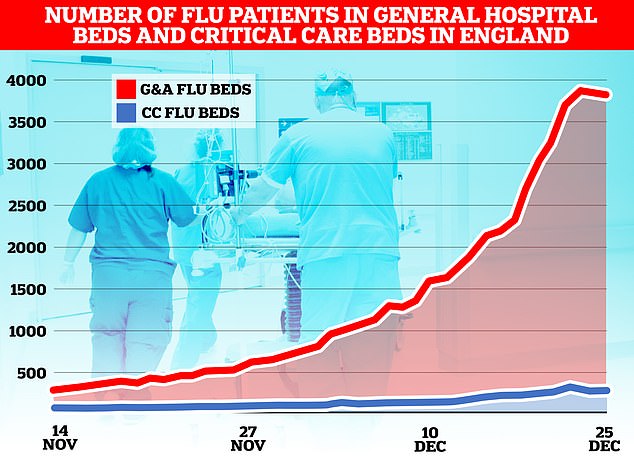

The flu-nami has swept across the NHS in England, the latest round of health service data shows, with over 3,800 admissions for the virus on December 23. Graph shows the number of beds on wards taken up by those with flu (red) and the number of beds occupied due to the virus in critical care (blue)
Is Covid running riot in Britain?
With the UK Health Security Agency’s (UKHSA) daily dashboard data and the Office for National Statistics’ (ONS) weekly Covid report paused over Christmas, it’s difficult to get a clear picture of where Britain currently is with the virus.
And the situation could become murkier yet, with data including the R rate set to stop being published publicly this month.
But the ONS’ last release, back on December 23, showed 1.2million had the virus on any given day in the week up to December 9 in England, up 9 per cent in a week.
It was equivalent to around one in 45 people.
One of Britain’s top experts predicted cases could reach more than 1.5million by Christmas.
But Professor Paul Hunter, a public health expert at the University of East Anglia, also told MailOnline cases would likely start to fall as festive socialising trickles off in January.
His comments came before the emergence of ‘the Kraken’, however.
More recent UKHSA figures show nearly 1,300 people infected with the virus were hospitalised on December 19. The figure is up by a third week-on-week.
The number of people infected with Covid taking up beds in wards soared above 8,600 on December 21, the latest data available shows. The figure has jumped 29 per cent in a week.
But it was still a fraction on the numbers seen during the earliest days of the pandemic. Up to 34,000 beds were taken up in January 2021.
Experts and medics have warned the virus is currently battering NHS hospitals in a ‘twindemic’ with the flu, with demand for beds soaring.
What is the situation abroad and will it affect the UK?
While Covid may already be blighting Britain’s shores, other countries around the world are struggling far worse.
Since lifting its controversial ‘zero Covid’ restrictions in early December, China has been hammered by rising cases, which have seen hospitals pack out and mortuaries fill up.
Experts believe low vaccination levels combined with weak natural immunity caused by delaying lifting the policy is behind the sudden rise.
But they also fear the latest wave — which is thought to be causing more cases than ever in the country — could spawn the perfect breeding ground for a new variant.
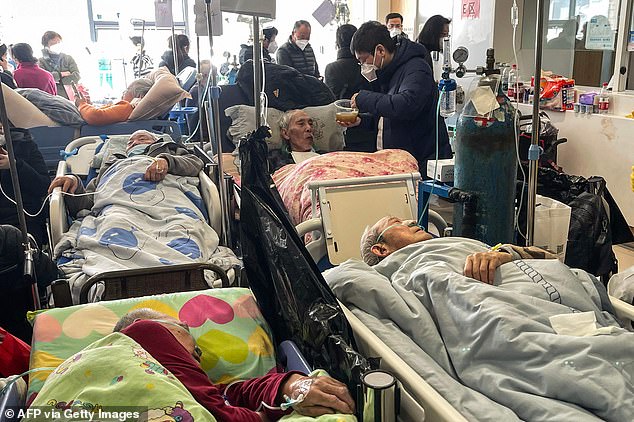

Chinese officials have admitted that the country’s total number of Covid-related deaths is ‘huge’. Pictured: Patients on stretchers at Tongren hospital in Shanghai today
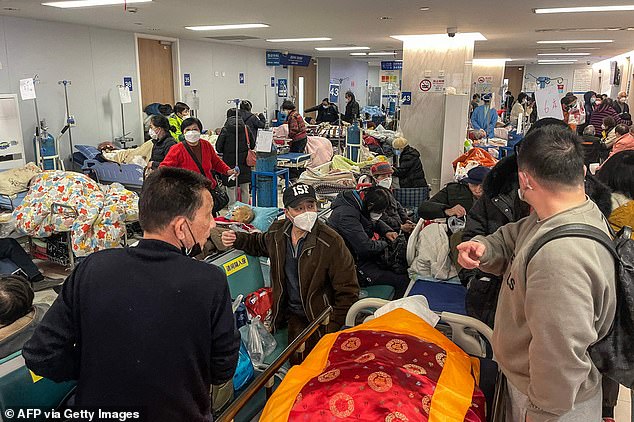

Tongren hospital in Shanghai, pictured, has been overwhelmed by patients after Beijing’s ‘zero-Covid’ hardline approach was abruptly loosened last month
China has also been accused of under-reporting its cases and withholding virus samples, reducing the likelihood of any new variant being spotted.
It has led to Britain announcing new travel restrictions for passengers from the country, with pre-departure tests set to be made mandatory from tomorrow.
Optional PCR tests on arrival to track for new variants will be rolled out from January 8, but if travellers choose to take one and test positive, they won’t have to isolate in Britain.
Officials are concerned China is not sharing all its Covid data, meaning the chances of a more contagious variant slipping by unnoticed are greater.
Are current variants in circulation a threat?
The ‘key thing to look out for’ with Covid in Britain currently is a new variant, according to health minister Will Quince.
Not only are there fears around a potential doomsday strain coming in from China, but experts are concerned about the ‘Kraken’ XBB.1.5 that is already on UK shores.
The strain, a mutated version of Omicron XBB that caused cases to quadruple in just one month in some nations, has additional mutations that some fear could help it bypass natural and vaccine-induced immunity.
Latest surveillance data suggest it is behind up to half of all Covid cases in the worst-hit regions.
Figures from the Sanger Institute, one of the UK’s largest Covid surveillance centres, shows 50 per cent of cases in Wirral last week were caused by XBB.1.5.
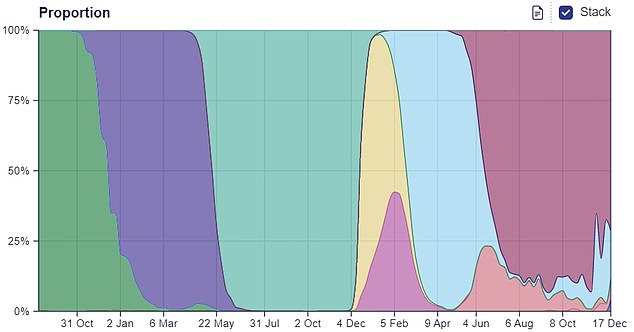

Figures from the Sanger Institute, one of the UK’s largest Covid surveillance centres, shows 4 per cent of cases in the week to December 17 were caused by XBB.1.5 (shown in purple, bottom right corner)
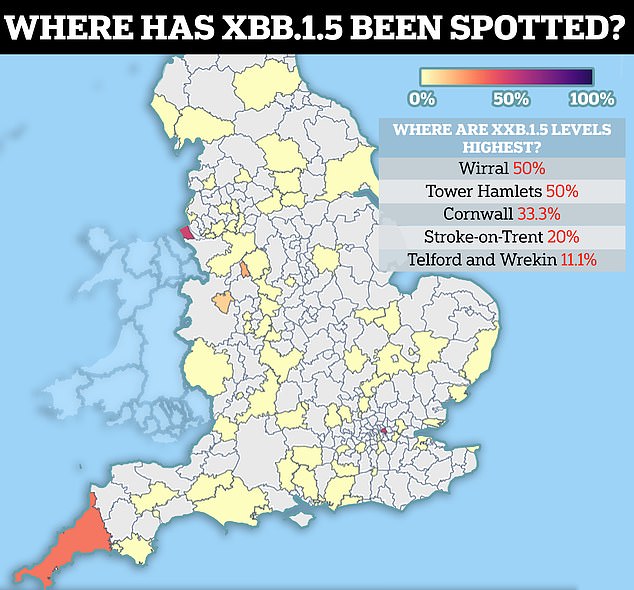

Figures from the Sanger Institute, one of the UK’s largest Covid surveillance centres, show XBB.1.5 was spotted nine times in the week to December 17. Five of the cases were spotted in Wirral in Merseyside, where scientists estimate it is behind 50 per cent of cases. One XBB.1.5 sample was sequenced in Stroke-on-Trent, where 20 per cent of cases are thought to be caused by the strain. Telford and Wrekin in Shropshire (11 per cent), Tower Hamlets in London (50 per cent) and Cornwall (33 per cent) all each reported one strain caused by the Omicron sub-variant
It is also currently running rife in the US, accounting for more than 40 per cent of cases across the country. Hospitalisations rose 40 per cent in the the country in the month up to December 28.
The rise is even more stark in the over-70s, with 52 per cent more seeking hospital care on that day, compared to one month earlier.
But experts said there is no indication XBB.1.5 is behind the uptick in severe cases.
Dr Barbara Mahon, director of the CDC’s Coronavirus and Other Respiratory Viruses Division, told CBS News: ‘We’re projecting that it’s going to be the dominant variant in the North East region of the country and that it’s going to increase in all regions of the country.
‘There’s no suggestion at this point that XBB.1.5 is more severe.’
Even if the vaccines do not work perfectly against the variant, immunity is likely to still hold up, with most Brits also having been exposed to former Omicron variants.
High levels of protection against the virus gave ministers the confidence to ditch all Covid measures last year as the country moved to living with the virus.
BA.5 Omicron, which most people have some level of immunity to already, remains the dominant variant in the UK, making up around 80 per cent of cases as of December 17.
Does the variant cause different symptoms?
In short, no.
Experts believe XBB.1.5 causes the same sort of symptoms as the other current variants of Covid.
These include a high temperature or shivering, when skin feels hot to touch on the chest or back.
Patients are still experiencing a new and continuous cough, with the NHS suggesting three or more coughing episodes in a day could be a sign.
XBB.1.5 can also cause a loss or change to the sense of smell or taste, shortness of breath, feeling of exhaustion, body aches, a headaches and sore throat.
A blocked or runny nose, loss of appetite, diarrhoea and feeling sick or being sick can all also indicate an infection.
Many of these symptoms are similar to those caused by other winter illnesses, including colds or flu.
However, Dr Allison Arwady, Chicago Department of Public Health Commissioner, yesterday said symptoms were more likely to be less severe than flu.
She told NBC: ‘Covid is showing up very much like it already has. I think, if anything, we are seeing it a little bit less likely to have the more severe symptoms.
‘Definitely people get the severe symptoms still, especially if they’re not up-to-date with their vaccines.
‘But more often now we are seeing people — especially if they’re fully up-to-date, maybe it’s their second time getting Covid, whatever it might be — we’re seeing more people actually just have cold-like symptoms, less likely to have those flu-like, really feeling very sick, the high fevers.’
Will restrictions return?
The pressures on the NHS and threats of variants at home and abroad have led some experts to call for the return of Covid restrictions.
Health chiefs and scientists have already advised adults and pupils to stay at home if they are unwell, don masks if they must go outside when sick and called for the booster rollout to be widened in a bid to ease NHS demand.
Now, ministers are understood to have last-resort plans to advise Brits to wear masks on public transport, WFH and socially distance if the overwhelmed health service ‘is at risk of collapse’.
But critics hit out at the response, warning the NHS’s annual winter crisis can’t be used as an ‘excuse to reintroduce Covid-era restrictions’.
Others warned that further restrictions now will only leave Britons ‘more vulnerable’ to Covid and flu.
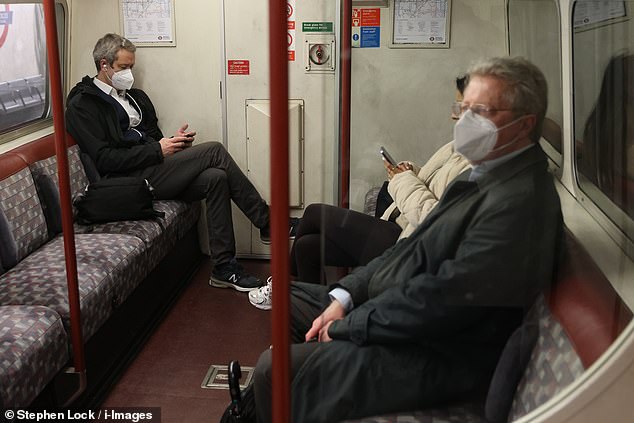

Pictured: People wearing face masks on the London Underground on January 4 after new advice has been given to curb rising infections as flu and Covid number increase
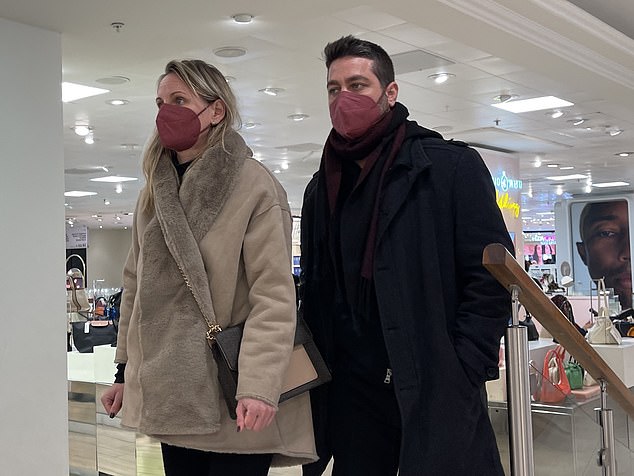

Pictured: London shoppers wearing face masks in shops on Oxford Street on January 3
Christopher Snowdon, head of lifestyle economics at the Institute of Economic Affairs, told MailOnline that staying at home when ill and infectious is ‘always good advice’.
He said: ‘But we mustn’t allow the NHS’s annual winter crisis to be used as an excuse to reintroduce Covid-era restrictions.
‘There is no evidence that the latest sub-variant of Omicron is more dangerous and the Chicken Littles warning of disaster have been wrong again and again for 18 months.’
No10 vowed never to return to lockdown when it ushered in its ‘living with Covid’ plans in April.
The move saw the end of the £2billion-per month Test and Trace scheme and legal requirement to self-isolate.
Leading experts said it was time to drop measures because of the wall of immunity built by vaccination and natural infections.
In other related news…
Covid-style measures COULD return ‘under official plans to save the NHS’: Zealots call for masks in public, WFH by default and return of social distancing as schools tell ill kids to stay away
Rishi Sunak vows to get a grip on NHS crisis in New Year push: PM will give first big speech TODAY trying to show he has a plan to revive UK’s fortunes and boost maths skills – as poll finds he has leapfrogged Keir Starmer as ‘best premier’
‘Kraken’ Covid variant XBB 1.5 already makes up HALF of cases in worst-hit places… so has it reached YOUR area?
